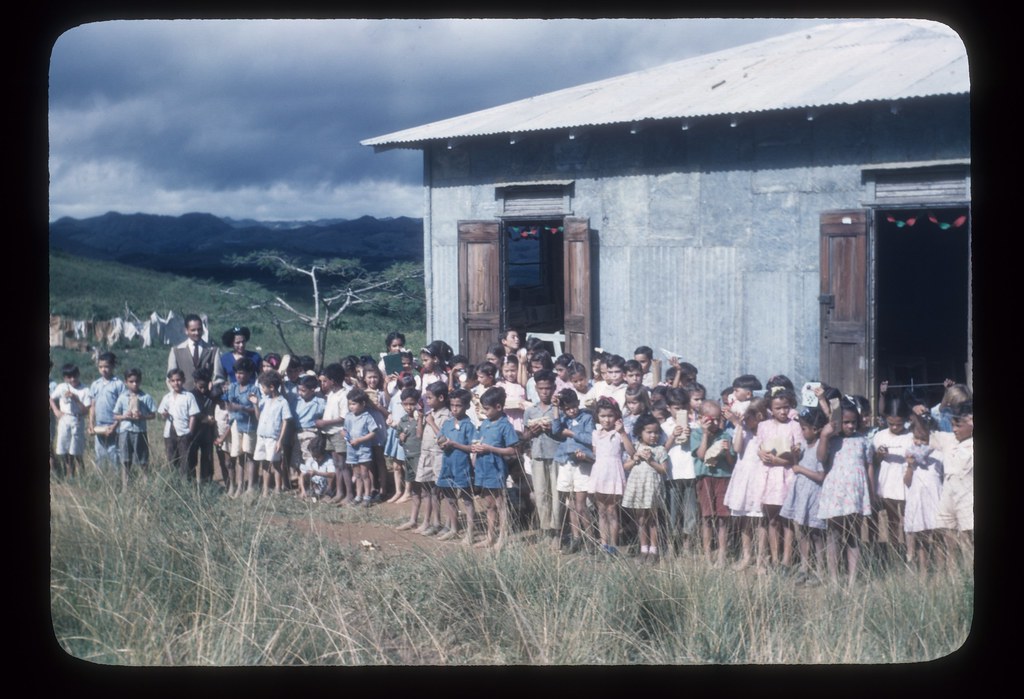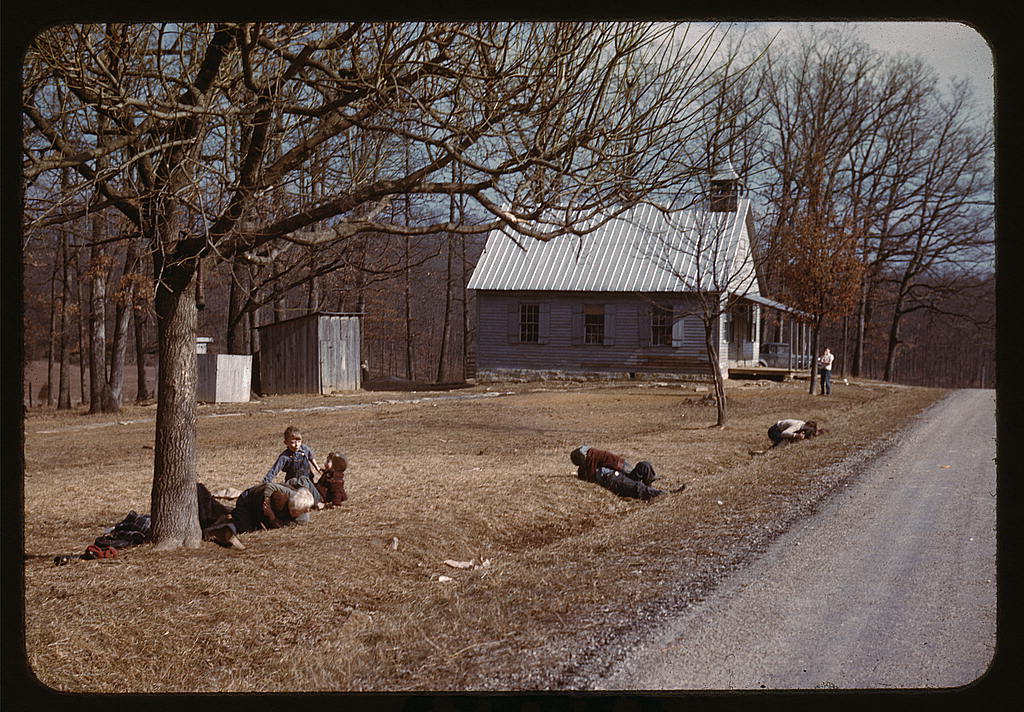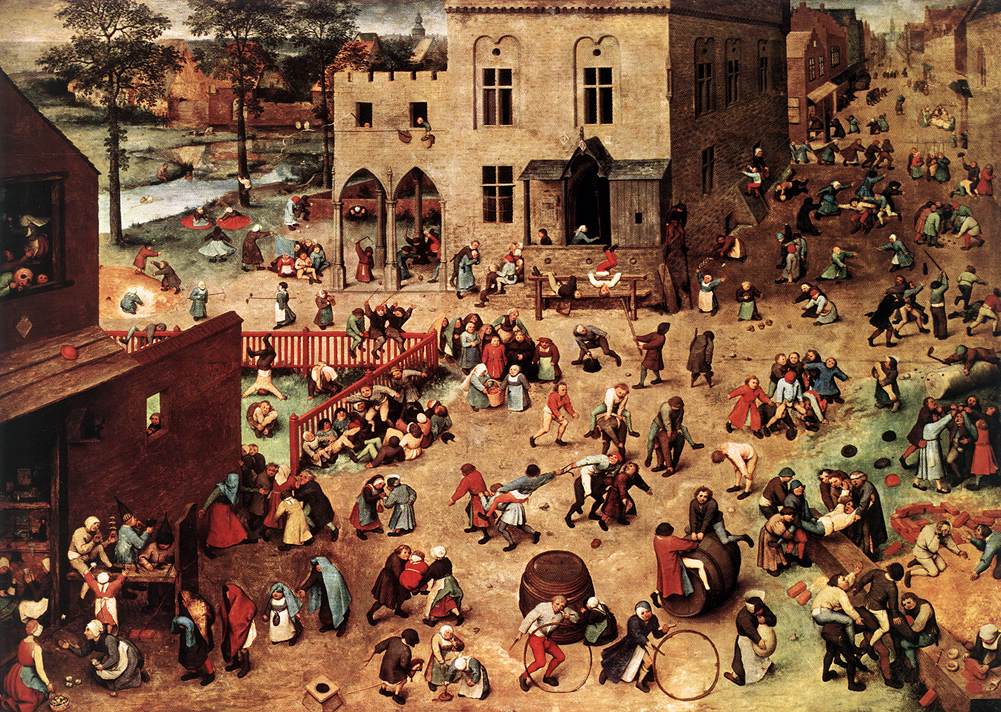.
![St. Anne's Kindergarten Class | by National Library of Ireland on The Commons]()
St. Anne's Kindergarten Class, This photo was taken at the Ursuline Convent, Waterford.: photographer unknown, 17 June 1927 (National Library of Ireland)
I walk through the long schoolroom questioning;
A kind old nun in a white hood replies;
The children learn to cipher and to sing,
To study reading-books and histories,
To cut and sew, be neat in everything
In the best modern way — the children’s eyes
In momentary wonder stare upon
A sixty-year-old smiling public man.
![Image, Source: digital file from intermediary roll film]()
Mountain children on steps of school in Breathitt, Jackson County, Kentucky: photo by Marion Post Wolcott, September 1940 (Farm Security Administration/Office of War Information Collection, Library of Congress)
![]()
Children in front of school, Puerto Rico: photo by Melvin Lauver, c. 1946-48; image by Tom Lehman, 20 July 2011
![]()
Children playing by road near school house, iowa or Kansas [?]: photo by John Vachon, c. March 1942 (Farm Security Administration/Office of War Information Collection, Library of Congress)
![File:Meyerheim Versteckspiel.jpg]()
Three children playing "hide and seek" in a forest (Versteckspiel im Wald): Friedrich Eduard Meyerheim (1808-1879), n.d., oil on tinplate, 17 x 20 cm
Children's Games (detail: "Hide and Seek"): Pieter Bruegel the Elder, 1559-60, oil on wood, 118 x 161 cm (Kunsthistorisches Museum. Vienna)
![File:BRU - CHD 13.jpg]()
Children's Games(detail: "Blind Man's Buff"): Pieter Bruegel the Elder, 1559-60, oil on wood, 118 x 161 cm (Kunsthistorisches Museum. Vienna)
![]()
Children's Games: Pieter Bruegel the Elder, 1559-60, oil on wood, 118 x 161 cm (Kunsthistorisches Museum. Vienna)
![File:Blind-Man's Buff, Paul Jarrard & Sons.JPG]()
Blind-Man's Buff: artist unknown, before 1830, published by Paul Jarrard and Sons (London, England). Print made within the lifetime of King George IV of England (12 August 1762 – 26 June 1830); image by Daderot, 30 April 2008
![]()
Blind Man's Buff: Francisco de Goya y Lucientes, 1788-89, oil on canvas, 269 x 350 cm (Museo del Prado, Madrid)
![]()
Blindman's Buff (detail): Jean-Honoré Fragonard, 1775-80, oil on canvas (National Gallery of Art, Washington)
![Children from an Otomi indigenous family pass the time drawing, on the sidewalk of their apartment building after it was declared uninhabitable by authorities after Tuesday's 7.1 earthquake, at the corner of Guanajuato and Monterrey streets in the Roma neighborhood of Mexico City, Saturday, Sept. 23, 2017. (AP Photo/Marco Ugarte)]()

St. Anne's Kindergarten Class, This photo was taken at the Ursuline Convent, Waterford.: photographer unknown, 17 June 1927 (National Library of Ireland)
I
I walk through the long schoolroom questioning;
A kind old nun in a white hood replies;
The children learn to cipher and to sing,
To study reading-books and histories,
To cut and sew, be neat in everything
In the best modern way — the children’s eyes
In momentary wonder stare upon
A sixty-year-old smiling public man.
II
I dream of a Ledaean body, bent
Above a sinking fire, a tale that she
Told of a harsh reproof, or trivial event
That changed some childish day to tragedy —
Told, and it seemed that our two natures blent
Into a sphere from youthful sympathy,
Or else, to alter Plato’s parable,
Into the yolk and white of the one shell.
Above a sinking fire, a tale that she
Told of a harsh reproof, or trivial event
That changed some childish day to tragedy —
Told, and it seemed that our two natures blent
Into a sphere from youthful sympathy,
Or else, to alter Plato’s parable,
Into the yolk and white of the one shell.
III
And thinking of that fit of grief or rage
I look upon one child or t’other there
And wonder if she stood so at that age —
For even daughters of the swan can share
Something of every paddler’s heritage —
And had that colour upon cheek or hair,
And thereupon my heart is driven wild:
She stands before me as a living child.
I look upon one child or t’other there
And wonder if she stood so at that age —
For even daughters of the swan can share
Something of every paddler’s heritage —
And had that colour upon cheek or hair,
And thereupon my heart is driven wild:
She stands before me as a living child.
IV
Her present image floats into the mind —
Did Quattrocento finger fashion it
Hollow of cheek as though it drank the wind
And took a mess of shadows for its meat?
And I though never of Ledaean kind
Had pretty plumage once — enough of that,
Better to smile on all that smile, and show
There is a comfortable kind of old scarecrow.
Did Quattrocento finger fashion it
Hollow of cheek as though it drank the wind
And took a mess of shadows for its meat?
And I though never of Ledaean kind
Had pretty plumage once — enough of that,
Better to smile on all that smile, and show
There is a comfortable kind of old scarecrow.
V
What youthful mother, a shape upon her lap
Honey of generation had betrayed,
And that must sleep, shriek, struggle to escape
As recollection or the drug decide,
Would think her son, did she but see that shape
With sixty or more winters on its head,
A compensation for the pang of his birth,
Or the uncertainty of his setting forth?
Honey of generation had betrayed,
And that must sleep, shriek, struggle to escape
As recollection or the drug decide,
Would think her son, did she but see that shape
With sixty or more winters on its head,
A compensation for the pang of his birth,
Or the uncertainty of his setting forth?
VI
Plato thought nature but a spume that plays
Upon a ghostly paradigm of things;
Solider Aristotle played the taws
Upon the bottom of a king of kings;
World-famous golden-thighed Pythagoras
Fingered upon a fiddle-stick or strings
What a star sang and careless Muses heard:
Old clothes upon old sticks to scare a bird.
Upon a ghostly paradigm of things;
Solider Aristotle played the taws
Upon the bottom of a king of kings;
World-famous golden-thighed Pythagoras
Fingered upon a fiddle-stick or strings
What a star sang and careless Muses heard:
Old clothes upon old sticks to scare a bird.
VII
Both nuns and mothers worship images,
But those the candles light are not as those
That animate a mother’s reveries,
But keep a marble or a bronze repose.
And yet they too break hearts — O presences
That passion, piety or affection knows,
And that all heavenly glory symbolise —
O self-born mockers of man’s enterprise;
But those the candles light are not as those
That animate a mother’s reveries,
But keep a marble or a bronze repose.
And yet they too break hearts — O presences
That passion, piety or affection knows,
And that all heavenly glory symbolise —
O self-born mockers of man’s enterprise;
VIII
Labour is blossoming or dancing where
The body is not bruised to pleasure soul.
Nor beauty born out of its own despair,
Nor blear-eyed wisdom out of midnight oil.
O chestnut-tree, great-rooted blossomer,
Are you the leaf, the blossom or the bole?
O body swayed to music, O brightening glance,
How can we know the dancer from the dance?
The body is not bruised to pleasure soul.
Nor beauty born out of its own despair,
Nor blear-eyed wisdom out of midnight oil.
O chestnut-tree, great-rooted blossomer,
Are you the leaf, the blossom or the bole?
O body swayed to music, O brightening glance,
How can we know the dancer from the dance?
William Butler Yeats (1865-1939): Among School Children, 1926, from The Tower (1928)
This poem was writ after a visit by the poet to a convent school in Waterford in 1926
Lunchtime. Some very [well] behaved young children sitting down to their lunch at a kindergarten in the buffer zone between Georgia and South Ossetia. This school was supported by the Danish Refugee Council who, among other organisations, have helped to re-build homes, businesses and schools in the years following the 2008 South Ossetia war.: photo by c_c_clason, 7 November 2011
and wonder if she stood so at that age

Mountain children on steps of school in Breathitt, Jackson County, Kentucky: photo by Marion Post Wolcott, September 1940 (Farm Security Administration/Office of War Information Collection, Library of Congress)

Children in front of school, Puerto Rico: photo by Melvin Lauver, c. 1946-48; image by Tom Lehman, 20 July 2011

Children playing by road near school house, iowa or Kansas [?]: photo by John Vachon, c. March 1942 (Farm Security Administration/Office of War Information Collection, Library of Congress)

Three children playing "hide and seek" in a forest (Versteckspiel im Wald): Friedrich Eduard Meyerheim (1808-1879), n.d., oil on tinplate, 17 x 20 cm
Children's Games (detail: "Hide and Seek"): Pieter Bruegel the Elder, 1559-60, oil on wood, 118 x 161 cm (Kunsthistorisches Museum. Vienna)

Children's Games(detail: "Blind Man's Buff"): Pieter Bruegel the Elder, 1559-60, oil on wood, 118 x 161 cm (Kunsthistorisches Museum. Vienna)

Children's Games: Pieter Bruegel the Elder, 1559-60, oil on wood, 118 x 161 cm (Kunsthistorisches Museum. Vienna)

Blind-Man's Buff: artist unknown, before 1830, published by Paul Jarrard and Sons (London, England). Print made within the lifetime of King George IV of England (12 August 1762 – 26 June 1830); image by Daderot, 30 April 2008

Blind Man's Buff: Francisco de Goya y Lucientes, 1788-89, oil on canvas, 269 x 350 cm (Museo del Prado, Madrid)

Blindman's Buff (detail): Jean-Honoré Fragonard, 1775-80, oil on canvas (National Gallery of Art, Washington)







